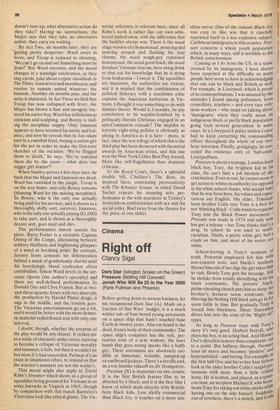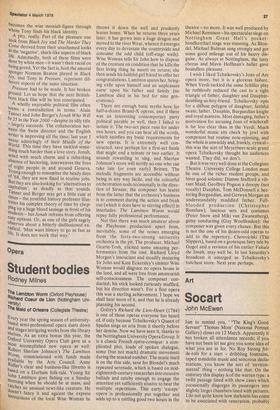Cinema
Right off
Clancy Sigal
Dark Star (Islington Screen on the Green) Pressure (Notting Hill Coronet) Jonah Who Will Be 25 In the Year 2000 (Paris Pullman and Phoenix)
Before getting down to serious business, let me recommend Dark Star (A). Made on a fraction of Star Wars' budget, it is a much wittier tale of four bored young astronauts on a space ship that hasn't touched base Earth in twenty years. Also on board is the dead, frozen body of their commander. The space ship's computer has the soft, persuasive tone of a sexy woman; the laser bomb that goes wrong speaks like a huffy gay. These astronauts are absolutely credible as immature, irritable, jumped-up ex-surfboard jockeys. There's a terrific end, an even funnier takeoff on Dr Strangelove.
Pressure (X) is important on two counts. It is the first British feature film to be directed by a black; and it is the first film I know of which deals directly with Britishborn black kids. Less slickly commercial than Black Joy, it touches on a more sen sitive nerve. One of the reasons Black Joy was easy to like was that it carefully restricted itself to a less explosive subject, Caribbean immigrants to this country. Pressure concerns a whole youth population which, in many ways, still is invisible to the British consciousness.
Coming as I do from the US, in a sense created by its immigrants, I have always been surprised at the difficulty so manY people here seem to have in acknowledging that one can be black and British as well. For example, in Liverpool, which is proud of its cosmopolitanism, I was amazed by the attitudes I found among policemen, town councillors, teachers and even race relations workers who insist on talking about `immigrants' when they really mean an indigenous black or partly black population going back several generations in some cases. In a Liverpool 8 police station I once had to keep correcting the commanding officer throughout the whole of our twohour interview. Finally, grudgingly, he con; ceded the existence only of 'half-caste Liverpudlians. Pressure is about a teenage, London-born black boy, Tony, the brightest kid in his
class. He can't find a job because of dis crimination. Even worse, he cannot seem W get across to whites in authority (as opposed to his white school chums, who accept him) that he was born here, his values and expec' tations are English. His older, Trinidad' born brother Colin says Tony is a fool for
not `thinking black'. Colin wants to organise Tony into the Black Power movement Pressure was made in 1974 and only now has got a release but Tony thinks that's 8 drag. In school he was used to multi
racialism. Sheila, a pretty white girl, had a crush on him, and most of his mates are white.
School-leaving is Tony's moment of truth. Potential employers fob him with non-existent tests, and Sheila's landladY throws him out of her digs the girl takes hiln to visit. Slowly Tony gets the message. Still he shrinks from totally identifying with the black community. His parents' black, psalm-shouting church puts him to sleep, his brother's lectures seem irrelevant, the thieving his Notting Hill black pals go in for seem futile to him. But gradually TonY IS forced into blackness. Sheer frustration drives him into the arms of the `Right oni' types. As long as Pressure stays with TonY,s story it's very good. Herbert Norvill, wit° • plays the boy, is an acting find. And Horace Ove's direction is more than competent -UP to a point. But halfway through, Pressure. loses its nerve and becomes `positive' all° hyperpolitical and boring. For example, in • the first half Ove and his writer Sam Selven look at the older brother Colin's turgid Pre; tensions with more than a little critical. irony. He is written, and played, as a quasi con man, an incipient Michael X who broW. beats Tony for taking out white chicks while having one on the side himself. Sudden out of nowhere, there's a switch, and Cohn
becomes the wise messiah-figure through Whom Tony finds his black identity. A pity, really. Part of the pleasure one
took from Black Joy and The Harder They Come derived from their unashamed looks
at the 'negative', shark-like aspects of black life. Admittedly, both of these films were done by white men — it wasn't their racial ox
being gored. Yet the fact is, both the amoral Sponger Norman Beaton played in Black 0Y, and Tony in Pressure, represent different aspects of the same situation. Pressure had to be made. It has broken ground. Let us hope that the next Britishborn black film will be less constipated.
A wholly enjoyable political film often
seems a contradiction in terms. Alain Tanner and John Berger's Jonah Who Will be 25 in the Year 2000 — despite its silly title
— largely succeeds. The collaboration between the Swiss director and the English writer is improving all the time; last year I
wrote admiringly of their Middle of the World. This time they have tackled some
thing much harder than a love story. Jonah, acted with much charm and a refreshing absence of hectoring, interweaves the lives
et. eight people in and around Geneva.
Young enough to remember the heady days of '68, they are now fixed in routine jobs. Bt they are also looking for 'alternatives to capitalism', as deadly as that sounds. .tanner and Berger may get a little cute at
times _ the youthful history professor illus trates his complex theory of time by chopPing up a huge blood sausage in front of his students — but Jonah refrains from offering
easy options. Or, as one of the girls sagely observes about a bitterly disillusioned ex radical want history to go as fast as life. It does not work that way.'
re



































 Previous page
Previous page